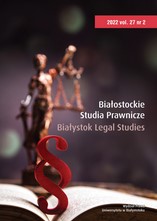Spontaneous Assemblies during the COVID-19 Pandemic in Poland – A Case Study Analysis
Spontaneous Assemblies during the COVID-19 Pandemic in Poland – A Case Study Analysis
Author(s): Tomasz WichaSubject(s): Constitutional Law, Government/Political systems, Health and medicine and law
Published by: Temida 2
Keywords: COVID-19 pandemic; freedom of assembly; spontaneous assemblies;
Summary/Abstract: COVID-19 turned into a global pandemic and affected public life in many states worldwide and in the Republic of Poland as well. The change of life under the pandemic regime meant a huge alteration in many aspects for most people. The unprecedented situation, for which the Polish authorities were unprepared, forced an immediate change in the law in Poland because of the introduction of the state of epidemic emergency. One of the instances of the changes of law was the limitation of freedom of assembly. The restriction of freedom of assembly was introduced by decrees, not by acts of parliament. The restrictions were described as illegal by the opposition and some parts of society. Many formal remarks were made by the Polish Ombudsman. The judgment of the Constitutional Tribunal in Poland of 22 October 2020 on abortion caused large-scale demonstrations throughout Poland as people wanted to express their views on the decision, which was perceived as the practical end of the compromise on abortion in the Republic of Poland. The research for this article was undertaken by means of system analysis and the analysis of the decision-making process.
Journal: Białostockie Studia Prawnicze
- Issue Year: 27/2022
- Issue No: 2
- Page Range: 163-176
- Page Count: 14
- Language: English

